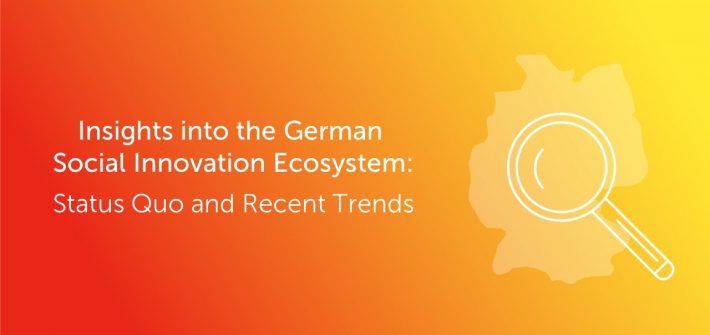What is the state of the framework conditions for social innovation in Germany? This question was addressed by Katrin Bauer, Christoph Kaletka, Daniel Krüger and Karina Maldonado-Mariscal from the Social Research Centre as part of the project ‘European Social Innovation Alliance’ and the German Competence Centre for Social Innovations (KoSI).
For this purpose, international experts were invited to discuss ideas for research priorities. In order to achieve the highest possible practical relevance of the research efforts, these approaches were operationalised with guiding questions, reflected upon by the academic partners of the project and supplemented and repeatedly compared with the perspectives of the project partners.
Next, the project partners from research and practice were invited to identify cases of framework conditions of social innovation and good practice. These cases were collected with the help of a comprehensive catalogue of guiding questions. On this basis, the experts of the competence center identified 95 cases in their respective fields of work and research. Among them are numerous funding programmes and innovation strategies as well as examples of support structures such as Social Innovation Labs. The importance of the understanding of social innovation in specific contexts was also taken into account, as was the framework of organisational forms. In addition, some cases of good practice were collected.
The results of the analyses by the team of the Social Research Centre show many developments that reflect a growing importance of social innovation at all levels. At the level of the federal states as well as in the regions and municipalities and at the federal level, numerous examples of efforts to explicitly promote social innovation can be identified. In addition to public funding, the importance of private funding is increasing – often with the idea of impact financing. Not only social entrepreneurs as important social innovators at the interface of non-profit and for-profit are recognized in the funding landscape.
In the established welfare sector, which is dominated by large welfare organisations, social innovation is now recognised as an increasingly relevant topic in its own right, with new cooperations and new initiatives emerging – often driven by intrapreneurs. These cooperations take place, for example, with and at higher education institutions and reflect a growing awareness of academic institutions as active players in a supportive ecosystem, thereby strengthening the “Third Mission” of higher education institutions.
International examples show that there is still room for further development. Despite efforts at local and regional level, one-stop shops for social innovators are often lacking and a holistic approach to supporting innovation would further strengthen initiatives of all types.
Please find the full report here: https://si-alliance.eu/news-events/details-news?tx_news_pi1%5Baction%5D=detail&tx_news_pi1%5Bcontroller%5D=News&tx_news_pi1%5Bnews%5D=7246&cHash=cc450bf4161704093d87d0ebc079b2c3
Link to the European Social Innovation Alliance: https://si-alliance.eu/
Link to the German Competence Centre for Social Innovations: https://kompetenzzentrum-soziale-innovationen.com
